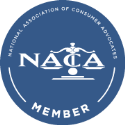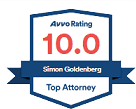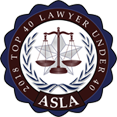Frequently Asked Debt Relief Questions
On this page, you can find some informative answers on many commonly asked debt relief questions. At the Law Office of Simon Goldenberg, PLLC, our New York debt relief lawyer has provided answers to these frequently asked questions for the purpose of helping debtors obtain relief from their financial disaster. Our goal is to help our clients eliminate their debt by utilizing all legal means. As your debt relief agency, we can help you take the next step to obtain debt relief. Once you have read through the following frequently asked questions, take the next step and schedule a free case evaluation.
Have Questions? Speak To Our Debt Relief Lawyers Today! Call (888) 301-0584.
- Questions About Bankruptcy - Qualified individuals can seek to discharge certain debts by filing for Bankruptcy. Learn how to qualify, what debts can be discharged, credit ramifications, and the costs to file for Bankruptcy, as well as other frequently asked questions.
- Questions About Student Loans - Learn about student loan forgiveness options, payment plans, defense from lawsuits, and the differences between federal and private student loans. Read about various resolution options including debt consolidation, loan rehabilitation, and negotiating settlement reduction on defaulted debts.
- Questions About Business Debts - When business debts become overwhelming, it important that the business owner takes stock of their options. Obligations such as business loans, merchant cash advance, SBA Loans, and debts owed to vendors can sometimes be restructured into affordable monthly payment, or sometimes they could even be reduced to a lower balance in a settlement negotiation. If the business debt progresses to a lawsuit, taking prompt action is imperative.
- Questions About Lawsuits & Judgments - Legal matters require serious attention. Learn about the consequences of a default judgment, and how your wages can be garnished or your bank account frozen if you ignore a lawsuit. Having a knowledgeable attorney to represent you can make a significant difference in how your matter is disposed in court.
- Questions About Credit Repair - Avoid credit repair scams and overpriced credit monitoring solutions by obtaining an absolutely free credit report and FICO credit score. Fixing bad credit can take time and determination. Learn how you can dispute your credit with the bureaus free of charge. However, in some sticky situations, you could benefit from the assistance of an experienced legal advocate to ensure that the credit bureaus correct any incorrect or unverifiable information, sparing your credit score from unnecessary harm.
- Questions about Name Change? - People change their names for many reasons, and often coincide with major life changes. Regardless of whether you are trying to change your name due to divorce, separation, identity theft, privacy concerns, religious reasons, or even if you'r trying to change the name of a child, our attorneys can guide you through the process and help mitigate any challenges along the way. Our lawyers provide assistance with legal name change to people residing across New York City.
Debt Relief Questions
- What should I do if I am being harassed by debt collectors? - If you are a victim of abusive or harassing debt collection actions, you must learn about your rights. Your first step should be to obtain information on the Fair Debt Collection Practices Act (FDCPA) and the Fair Crediting Report Act (FCRA). You may even be entitled to a statutory award of up to $1,000 in addition to actual damages.
- How to reduce credit card debt? - Once a credit card is in default, has been charged-off, and/or sent to collections, the balance can usually be negotiated. Although the creditor has no obligation to accept a reduced payment, they will oftentimes consider a settlement when they believe that their ability to collect the full balance is limited. Especially is situations where the debtor has genuine financial hardship, the creditor may be more inclined to permit a reduction. However, the creditor may elect to bring a credit card lawsuit at any time after default, and as such, most debtors would rather get into a settlement sooner rather then later.
- Can credit card debts be cancelled or discharged? - Unsecured credit card debts are the most common type of debt for people to seek a discharge. Credit cards can be included in both for Chapter 7 and Chapter 13 bankruptcy. In a Chapter 7 bankruptcy, a qualified filer may discharge their revolving credit lines in full. However, in a Chapter 13 bankruptcy, the debtor will enter into a payment plan with the creditor for a duration of 3 to 5 years. Seeking a discharge of your credit cards debts in bankruptcy could be a potentially quick and affordable form of debt relief, however, our attorneys encourage borrowers to explore other possible remedies, such as debt reduction and/or credit card lawsuit defense - while exploring bankruptcy as an option of last resort.
- Can I get a lower interest rate on my credit card debts? - Some lenders will periodically review accounts to ensure that the effective interest rate and other terms properly reflect their current offering in light of market rates. However, a borrower can proactively request to have their credit card account reviewed by the lender to see if they qualify for a rate reduction. Reducing the interest rate will effectively reduce the amount of interest that accrues on a revolving fast, which means, a borrower can potentially get out of credit card debt more quickly.
- How to reduce medical bills? - Medical bills can sometimes be resolved in ways that are unavailable to other types of debts. Many physicians, hospitals, and clinics will allow for reasonable payments plans and sometimes balance reductions in situations where the patient can exhibit financial hardship. Learn about how you might owe a medical debt even if a contract doesn't exist. Lastly, bankruptcy could be an effective approach to eliminating a large amount of healthcare related debt and doctors bills in a relately short period of time.
- How will debt relief affect my credit? - The answer to this question depends entirely upon the type of debt relief that you pursue. If your debt relief includes a payment plan, you must make the required payments to your creditors and ensure that you do not break the terms of your agreement. If you are delinquent, it will be reported to the consumer reporting agencies. If you pursue bankruptcy, damage may be done to your credit, but this can be repaired through financial responsibility after the discharge of your debts.
- Can I negotiate with my creditors on my own? - Yes, you are able to negotiate with debt collection agencies and creditors on your own. The most effective route to take, however, is to obtain the experienced assistance of a New York debt relief lawyer. The debt relief program can be a complex and time-consuming process when handled on your own. We understand the aggressive and strategic approaches that should be taken when dealing with creditors and we can provide you with the experienced assistance you need. We can negotiate with creditors on your behalf for maximum debt relief opportunities.
- Can creditors garnish my wages? - In order for your creditors to take the legal action of wage garnishment against you, a judgment must be issued. After a judgment is issued, the creditor will need to file for wage garnishment prior to that action being fulfilled. If your wages are being garnished or if a judgment has been placed against you, we can help you work toward resolving this matter. After you receive a summons, immediately contact our firm.
- What is a 1099-C? - Receiving a Form 1099-C for cancellation of debt does not mean that your obligation to repay the underlying debt has been extinguished. A 1099-C form is filed for tax purposes when certain triggers arise, such as when the creditor has been unable to collect and has deemed it uncollectable. A 1099-C can cause tax liability. If you pay taxes due to a 1099-c and you subsequently pay back a portio of the underlying debt, you may be elegible to request a refund for the taxes which were overpaid. When a debt is settled with a forgiveness of at least $600, the creditor will file a 1099-C to report the amount forgiven, which can be held as taxable income for the borrower. Speak to a certified tax professional to learn how debt forgiveness may affect your tax liabilities.
- Do I need to pay a debt that is charged-off on my credit report? - Generally, a charged-off account can still be collected by the creditor and it's agents. A charge-off is a declaration by the creditor that the debt is unlikely to ever be collected, however, it does not eliminate the actual obligation to repay the debt.
- What is the difference between "Delinquent" and "Default" account status? - When an account is paid on time, the status is considered to be current. When a few payments have been missed, accounts are generally considered delinquent. Oftentimes, loans that are in delinquency can be cured by making up the missed payments. However, when enough payments are missed, the account may be closed or charged-off, and the entire balance becomes due. This is called default status. Many credit card issuers will charge-off an account when the borrower misses 6 consecutive monthly payments. In contract, many private student loan lenders will wait about 270 days (9 months) before considering an account to be in student loan default. One critical distinction between the various status' is that in order to attempt negotiating a settlement reduction, an account must usually be in default status.
- What is Compound Interest? - Nearly every loan will include an interest component, but banks and lender might apply the interest differently. Typically, interest on loans are compounded on a regular interval, whether its daily, weekly, monthly, or annually. Such terms would be set forth in the lending agreement. Compound interest can cause a balance to grow quickly. Find out what compound interest means and how it affects your loan payments.
- How to stop debt collector phone calls? - It can be nervewracking to be at the receiving end of incessant calls from debt collectors. If you want to resolve the debt, speaking to the collectors might be necessary. However, if your goal is to stop the phone calls, there may be several remedies available. For example, you could mail a letter to the collector demanding that they cease & desist further contact, or that they limit their contact through certain channels. Alternatively, in some situations it might make send to file bankruptcy to stop all the collection activity and discharge any eligible debts.
- Changing the Surname of a Child - Life carries with it many ups and downs and oftentimes one may find that their name no longer fits their circumstances. Many people choose to change the surnames of their children in instances of separation or where one parent is absent. While this is one of the most common reasons for requesting a child’s name change, it can also be on of the most complicated. In deciding whether to grant a child’s legal name change a judge will weigh many factors, including the nature of the child's parental relationships, how long they have had their current name, and whether or not the name change would affect the child’s life in any adverse manner.
Do you have further questions?
If you have received a court summons or are being harassed by creditors, you will need substantial information on how these can be resolved. Do not try to navigate this circumstance alone! Take aggressive action today by speaking to our firm to learn how we can help.
Contact the Law Office of Simon Goldenberg, PLLC for the representation you deserve!











